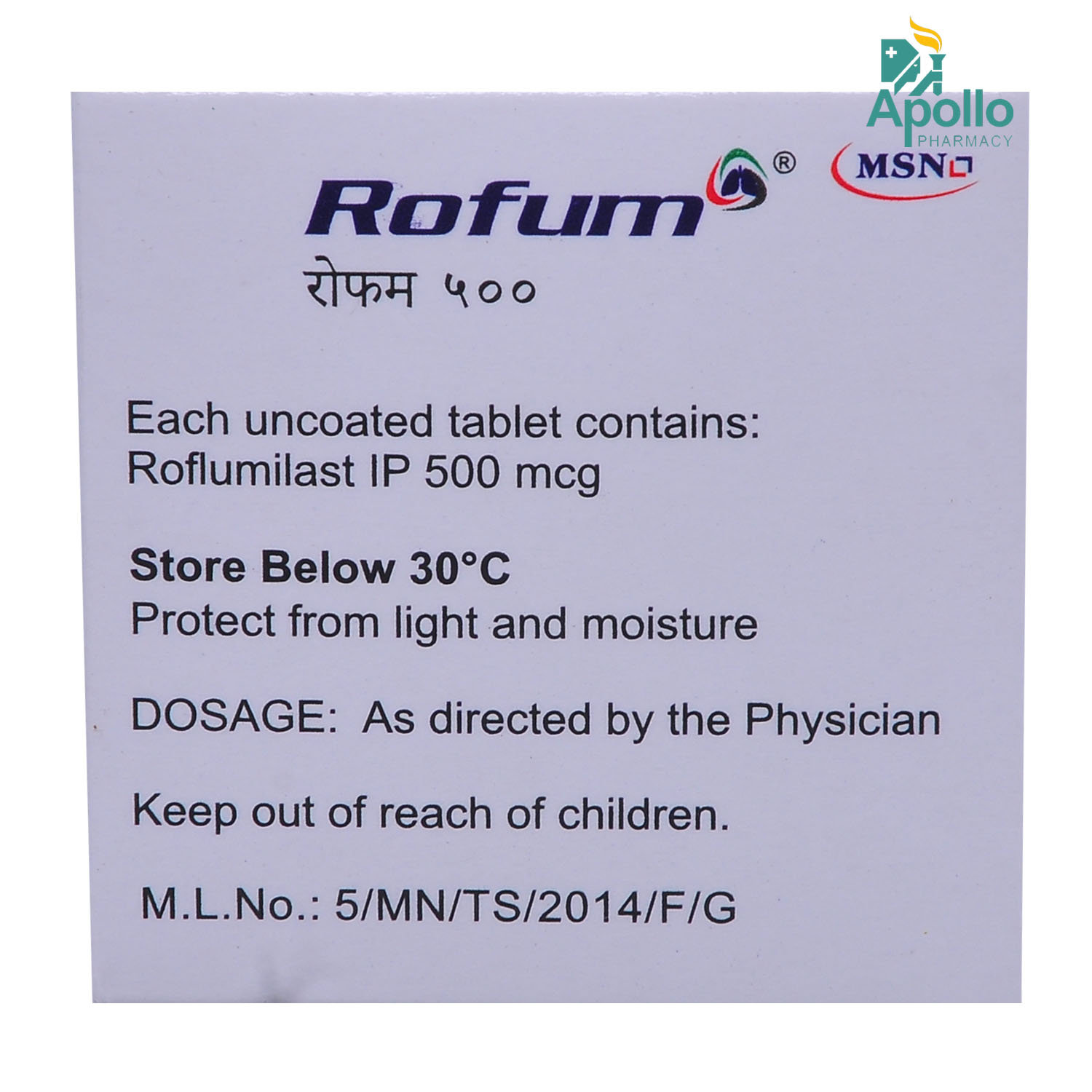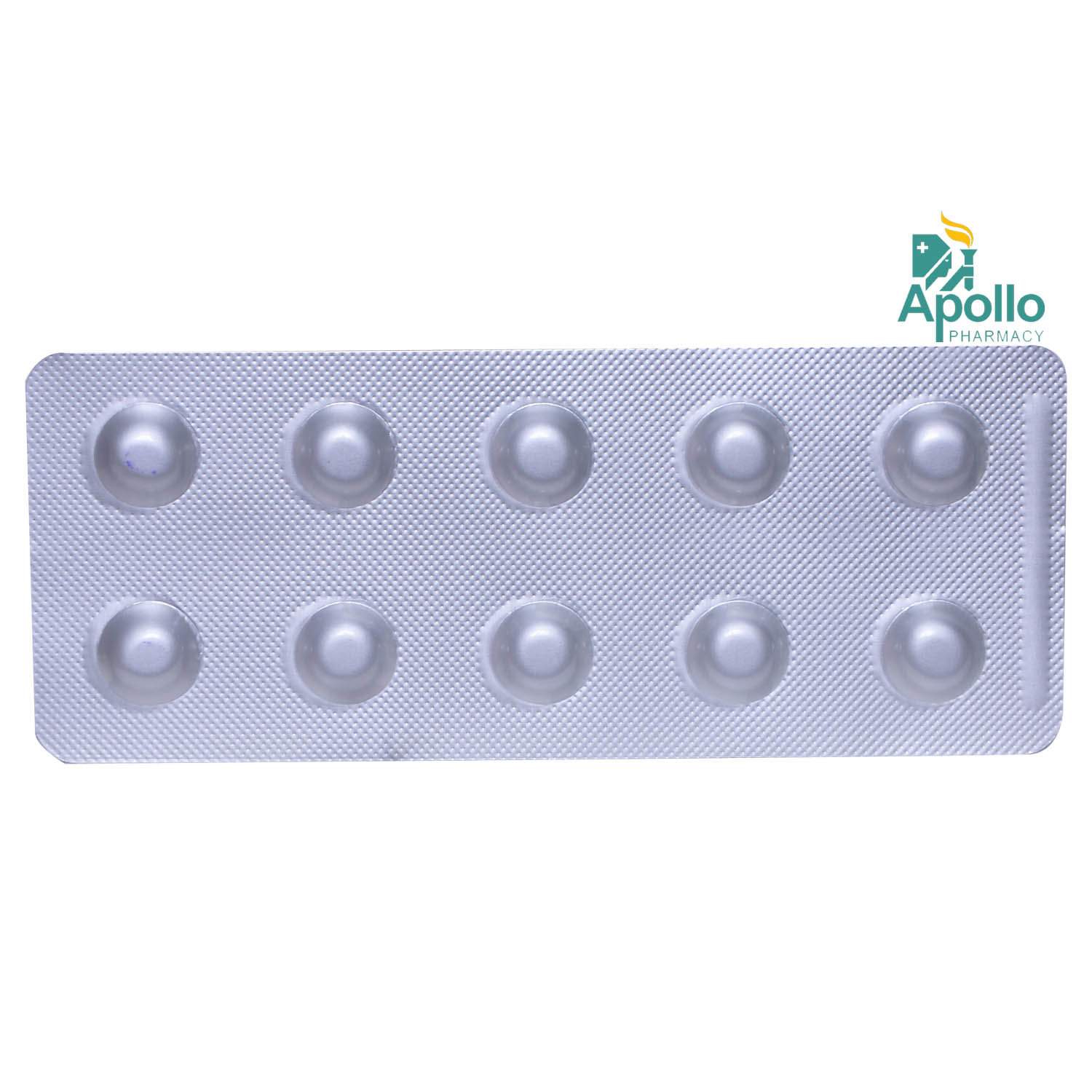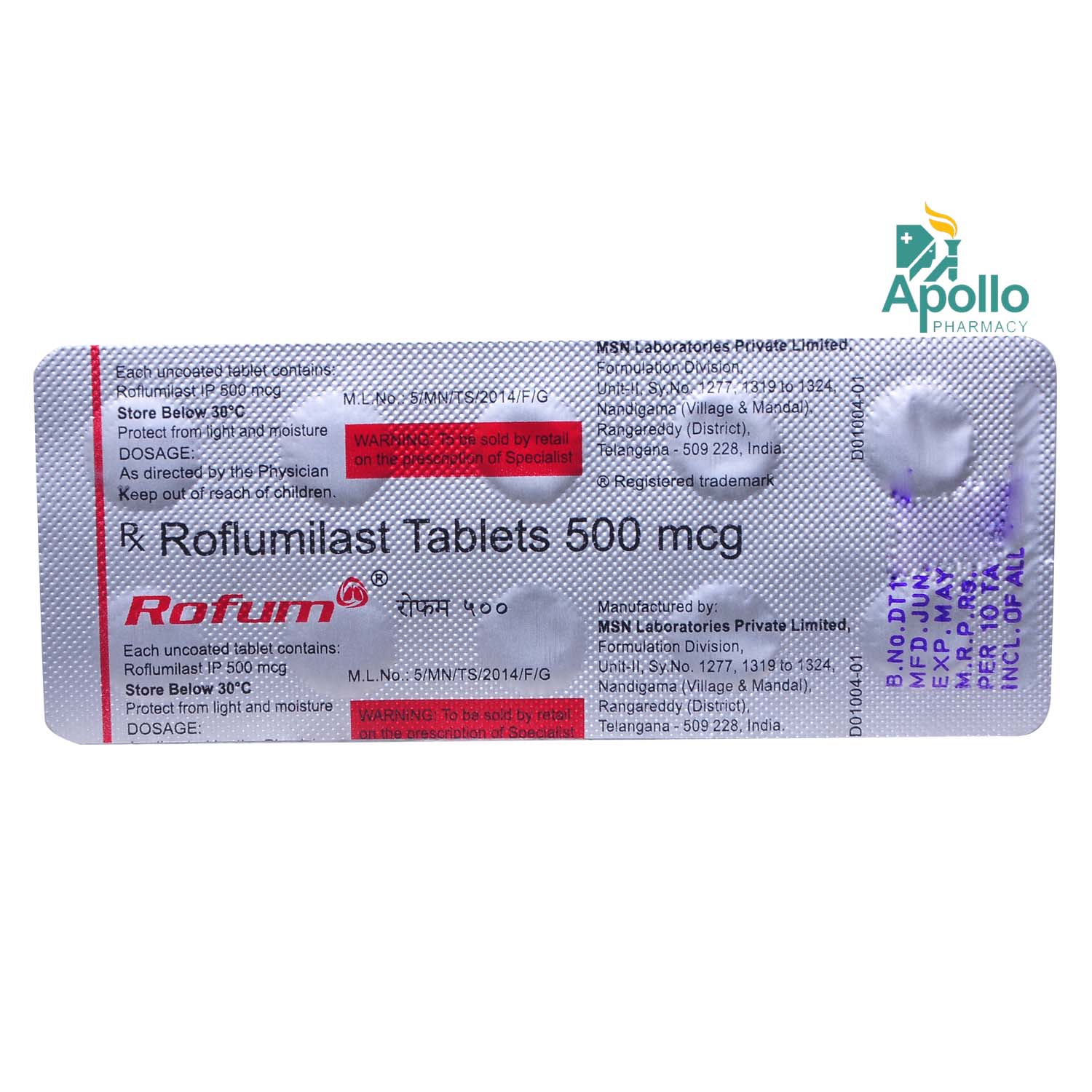Rofum 500 Tablet 10's
MRP ₹154.5
(Inclusive of all Taxes)
₹23.2 Cashback (15%)
Provide Delivery Location
Online payment accepted
 Prescription drug
Prescription drugWhats That
Composition :
Manufacturer/Marketer :
Consume Type :
Expires on or after :
Return Policy :
About ROFUM 500MG TABLET
ROFUM 500MG TABLET is a respiratory medicine that belongs to the class of 'phosphodiesterase inhibitors' primarily used to manage chronic obstructive pulmonary disease (COPD). Chronic obstructive pulmonary disease is a group of progressive lung diseases. It is a long-term condition which makes you hard to take breathe. People with COPD have emphysema and chronic bronchitis. Emphysema destroys air sacs in the lungs, which interferes with the movement of outward airflow. Bronchitis allows mucus to build up in the bronchial tubes by causing inflammation and narrowing of the tubes.
ROFUM 500MG TABLET contains Roflumilast, which helps in the treatment of chronic obstructive pulmonary disease (COPD). Roflumilast works by relaxing the airway in the lungs and making it easier to breathe. In addition to this, Roflumilast also helps treat the symptoms. It is generally a long-term treatment.
Take ROFUM 500MG TABLET with or without food or as directed by your doctor. It should be swallowed whole with a glass of water. Do not chew, bite, or break it. Your doctor will advise you how often you take your tablets based on your medical condition. You may experience diarrhoea, nausea, stomach ache, weight decrease and headache in some cases. Most of these side effects of ROFUM 500MG TABLET do not require medical attention and gradually resolve over time. However, if the side effects are persistent, reach out to your doctor.
Try not to stop taking this medicine on your own. Do not stop taking ROFUM 500MG TABLET despite symptomatic relief. Treat your condition effectually, continue taking ROFUM 500MG TABLET for as long as it has been prescribed for you. Do not take this medicine if you have any moderate or severe liver problems. Consult your doctor before taking ROFUM 500MG TABLET if you are a pregnant or breastfeeding woman. Avoid consuming alcohol along with ROFUM 500MG TABLET. ROFUM 500MG TABLET is not recommended for use in children and adolescents under 18 years of age.
Uses of ROFUM 500MG TABLET
Directions for Use
Key Benefits
ROFUM 500MG TABLET contains Roflumilast, which helps in the treatment of chronic obstructive pulmonary disease (COPD). Roflumilast works by relaxing the airway in the lungs and making it easier to breathe. In addition to this, roflumilast also helps treat the symptoms. It is generally a long-term treatment.
Storage
- Inform Your Doctor: Notify your doctor immediately about your diarrhoea symptoms. This allows them to adjust your medication or provide guidance on managing side effects.
- Stay Hydrated: Drink plenty of fluids to replace lost water and electrolytes. Choose water, clear broth, and electrolyte-rich drinks. Avoid carbonated or caffeinated beverages to effectively rehydrate your body.
- Follow a Bland Diet: Eat easy-to-digest foods to help firm up your stool and settle your stomach. Try incorporating bananas, rice, applesauce, toast, plain crackers, and boiled vegetables into your diet.
- Avoid Trigger Foods: Steer clear of foods that can worsen diarrhoea, such as spicy, fatty, or greasy foods, high-fibre foods, and dairy products (especially if you're lactose intolerant).
- Practice Good Hygiene: Maintain good hygiene to prevent the spread of infection. To stay healthy, wash your hands frequently, clean and disinfect surfaces regularly, and avoid exchanging personal belongings with others.
- Take Anti-Diarrheal Medications: If your doctor advises, anti-diarrheal medications such as loperamide might help manage diarrhoea symptoms. Always follow your doctor's directions.
- Keep track of your diarrhoea symptoms. If they don't get better or worse or are accompanied by severe stomach pain, blood, or dehydration signs (like extreme thirst or dark urine), seek medical help.
- Weight loss without physical activity needs immediate medical attention.
- Get a physical examination and blood tests done to identify factors causing weight loss that could be related to metabolism and thyroid function.
- Avoid smoking and alcohol intake as it can alter your liver condition and increase your weight loss.
- Practice meditation and yoga to avoid anxiety, which can be one of the leading causes of weight loss.
- Talk to your dietician and consume food which can maintain ideal weight.
- Inform your doctor about the nausea and discuss possible alternatives to the medication or adjustments to the dosage.
- Divide your daily food intake into smaller, more frequent meals to reduce nausea.
- Opt for bland, easily digestible foods like crackers, toast, plain rice, bananas, and applesauce.
- Avoid certain foods that can trigger nausea, such as fatty, greasy, spicy, and smelly foods.
- Drink plenty of fluids, such as water, clear broth, or electrolyte-rich beverages like coconut water or sports drinks.
- Use ginger (tea, ale, or candies) to help relieve nausea.
- Get adequate rest and also avoid strenuous activities that can worsen nausea.
- Talk to your doctor about taking anti-nausea medication if your nausea is severe.
- Record when your nausea occurs, what triggers it, and what provides relief to help you identify patterns and manage your symptoms more effectively.
- Hydrate your body: Drink enough water to prevent dehydration and headaches.
- Calm Your Mind: Deep breathing and meditation can help you relax and relieve stress.
- Rest and Recharge: Sleep for 7-8 hours to reduce headache triggers.
- Take rest: lie down in a quiet, dark environment.
- Cold or warm compresses can help reduce tension.
- Stay Upright: Maintain good posture to keep symptoms from getting worse.
- To treat headaches naturally, try acupuncture or massage therapy.
- Over-the-counter pain relievers include acetaminophen and ibuprofen.
- Prescription Assistance: Speak with your doctor about more substantial drug alternatives.
- Severe Headaches: Seek emergency medical assistance for sudden, severe headaches.
- Frequent Headaches: If you get reoccurring headaches, consult your doctor.
- Headaches with Symptoms: Seek medical attention if your headaches include fever, disorientation, or weakness.
- Talk to your doctor about your back pain and potential medication substitutes or dose changes.
- Try yoga or Pilates and other mild stretching exercises to increase flexibility and strengthen your back muscles.
- To lessen the tension on your back, sit and stand upright and maintain proper posture.
- To alleviate discomfort and minimize inflammation, apply heat or cold packs to the afflicted area.
- Under your doctor's supervision, think about taking over-the-counter painkillers like acetaminophen or ibuprofen.
- Make ergonomic adjustments to your workspace and daily activities to reduce strain on your back.
- To handle tension that could make back pain worse, try stress-reduction methods like deep breathing or meditation.
- Use pillows and a supportive mattress to keep your spine in the right posture as you sleep.
- Back discomfort can worsen by bending, twisting, and heavy lifting.
- Speak with a physical therapist to create a customized training regimen to increase back strength and flexibility.
- Prepare for a restful night's sleep: Develop a calming pre-sleep routine, like reading or meditation, to help your body relax and prepare for sleep.
- Create a sleep-conducive Environment: Make bedroom a sleep haven by ensuring it is quiet, dark and calm.
- Follow a Sleep Schedule: Go to bed and get up at the same time every day to help regulate your body's internal clock and increase sleep quality.
- Try relaxing techniques like deep breathing, mindfulness meditation and any others.
- Limit stimulating activities before bedtime: Avoid stimulating activities before bedtime to improve sleep quality.
- Monitor Progress: Keep track of your sleep patterns to identify areas for improvement.
- Consult a doctor if needed: If these steps don't improve your sleep, consult a doctor for further guidance and therapy.
- Consume more protein-rich foods and healthy fats like beans, avocados, cheese, nuts and lean meats to minimize appetite.
- Prefer foods high in fiber to help feel full for a long time.
- If you have decreased appetite, eat only when you are hungry.
- Eat several small meals or snacks all day.
- Try to take only small sips of fluids while eating.
Drug Warnings
Do not use ROFUM 500MG TABLET in more than the prescribed doses, leading to severe heart or lung problems. After taking ROFUM 500MG TABLET, if you experience irregular heartbeats, leg cramps, muscle weakness, numbness or tingling, or suicidal thinking and behaviour, please consult a doctor immediately. If you have cancer, heart disease, depression, inform your doctor before taking ROFUM 500MG TABLET. This medicine is recommended for use in children and adolescents under 18 years of age. Before taking ROFUM 500MG TABLET, inform your doctor if you are already on medications like theophylline, oral corticosteroids, methotrexate, enoxacin or cimetidine.
Drug-Drug Interactions
Drug-Drug Interactions
Login/Sign Up
Taking cladribine together with Rofum 500 Tablet may increase the risk of infections.
How to manage the interaction:
Although there is a interaction between Cladribine and Rofum 500 Tablet, but it can be taken together if prescribed by your doctor. However. if you experience fever, chills, loose stools, sore throat, muscle aches, difficulty breathing, and pain or burning while passing urine, contact a doctor immediately. Do not stop using any medications without a doctor's advice.
Drug-Food Interactions
Drug-Food Interactions
Login/Sign Up
Diet & Lifestyle Advise
- Smoking should be avoided while taking ROFUM 500MG TABLET as it can alter the blood levels of roflumilast, which may affect the dosing.
- It is essential to maintain hygiene like washing hands after coming from outside, as people with asthma/COPD are at a greater risk of infections.
- Stay active and do regular exercise to improve quality of life and increase tolerance to shortness of breath.
- Shortness of breath can be eased by doing pursed-lip breathing exercises. In this, relax your neck and shoulder muscles, breathe in with your nose for two seconds and breathe out through pursed lips for four seconds. Such exercises will help you to improve your breath.
- Eat foods rich in potassium such as tomatoes, bananas, asparagus, oranges, potatoes, avocados, dark leafy greens and beetroots as potassium is important for lung function and a potassium deficiency may cause breathing problems.
- Drink plenty of fluids every day to thin mucus which makes it easier to cough out.
- Maintain a diet that includes complex carbohydrates such as lentils, beans, barley, oats, quinoa, bran, peas and potatoes with skin.
- Limit or avoid the intake of caffeinated drinks such as tea, coffee, soda and energy drinks.
- Eat protein-rich foods such as meat, fish (particularly salmon, sardines, and mackerel), eggs and poultry.
- Exercise regularly to strengthen your breathing muscles and boost your immune system. Learning breathing exercises will help you move more air in and out of your lungs.
- Stop smoking as it can reduce the efficacy of the ROFUM 500MG TABLET and irritate the lungs and make breathing problems worse.
Side Effects of ROFUM 500MG TABLET
- Diarrhoea
- Nausea
- Stomach ache
- Weight loss
- Headache
- Loss of appetite
Habit Forming
Therapeutic Class
All Substitutes & Brand Comparisons
RX
Out of StockSpirolast Tablet
Koye Pharmaceuticals Pvt Ltd
₹125
(₹11.25 per unit)
19% CHEAPERRX
Out of StockRoflu 500mcg Tablet
Zydus Cadila
₹125
(₹11.25 per unit)
19% CHEAPERRX
Out of StockRofurest Tablet
Centaur Pharmaceuticals Pvt Ltd
₹125
(₹11.25 per unit)
19% CHEAPER
Drug-Diseases Interactions
Drug-Diseases Interactions
Login/Sign Up
FAQs
Drug-Drug Interactions Checker List
- METHYLPREDNISOLONE
- BUDESONIDE+FORMOTEROL
Special Advise
- Check your weight regularly while taking this medication. Tell your doctor right away of any unusual or extreme weight loss.
- ROFUM 500MG TABLET is not a bronchodilator and is not indicated for the relief of acute bronchospasm. Always carry a rescue inhaler.
Disease/Condition Glossary
COPD: It is a group of progressive lung diseases, most commonly emphysema (shortness of breath) and chronic bronchitis (inflammation and irritation of bronchial tubes). Initially, it may be mild, but it can lead to total blockage of airways and damage the lungs in severe cases. The major cause of COPD is smoking tobacco and exposure to air pollutants like asbestos and chemicals/fumes. Also, long-term exposure to fumes and chemicals may lead to COPD. The symptoms include chronic cough, shortness of breath or wheezing (whistle sound while breathing).

Have a query?
Alcohol
Safe if prescribed
The interaction of ROFUM 500MG TABLET with alcohol is unknown. Please consult a doctor before consuming alcohol with ROFUM 500MG TABLET.
Pregnancy
Consult your doctor
The safety of ROFUM 500MG TABLET in pregnant women is unknown and is given to pregnant women only if the doctor thinks benefits outweigh risks.
Breast Feeding
Consult your doctor
It is unknown whether ROFUM 500MG TABLET is excreted in human milk. It is given to breastfeeding mothers only if the doctor thinks benefits are greater than risks.
Driving
Safe if prescribed
ROFUM 500MG TABLET may cause blurred vision or dizziness in some people. Therefore, avoid driving if you notice any changes in vision or feel dizzy after taking ROFUM 500MG TABLET.
Liver
Consult your doctor
Do not take ROFUM 500MG TABLET if you have moderate or severe liver problems. ROFUM 500MG TABLET should be used with caution in patients with liver disease. Dose adjustment of ROFUM 500MG TABLET may be needed. Please consult your doctor.
Kidney
Consult your doctor
If you have any concerns regarding the use of ROFUM 500MG TABLET in patients with kidney problems, please consult a doctor.
Children
Safe if prescribed
ROFUM 500MG TABLET should not be used in children and adolescents under 18 years of age.
















